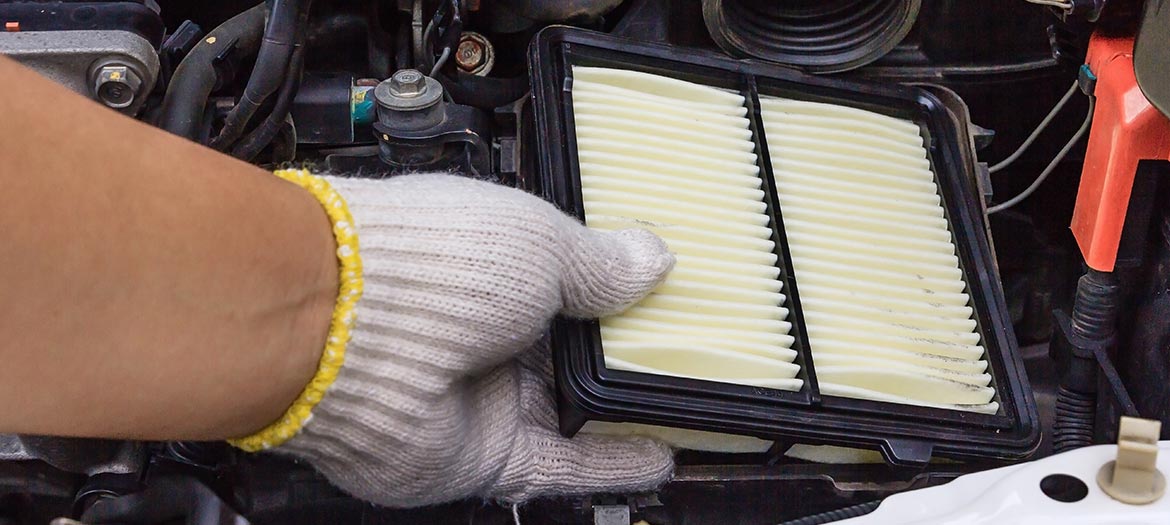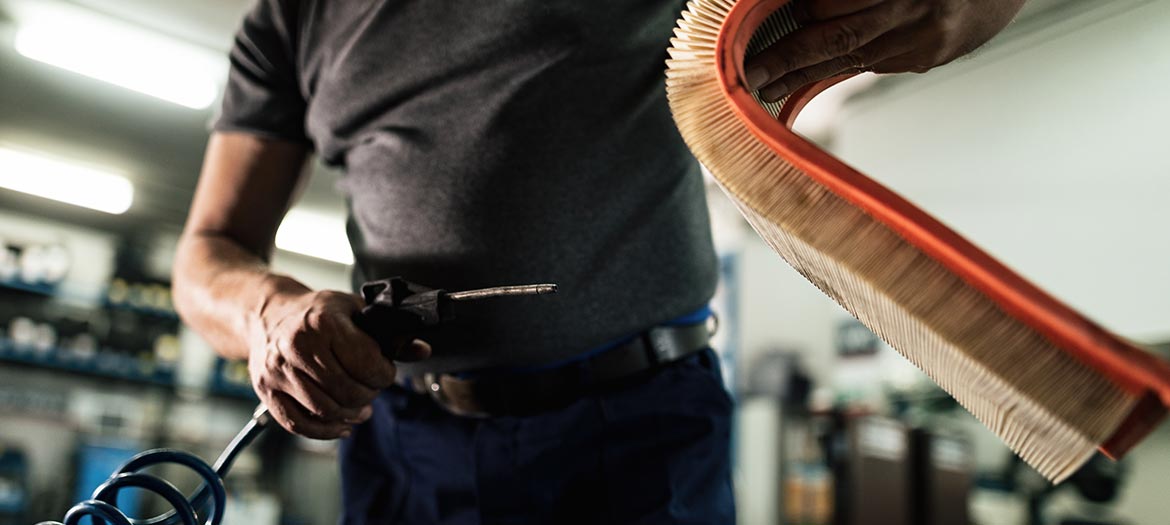The dangers of a dirty air filter
Regardless of the type of the internal combustion engine (ICE), the burning of the mixture would not be possible without the oxygen in the air. Since an engine uses about 13 times more air than fuel, it is clear how important it is to enable it to “breathe” uninterruptedly. What must not, however, end up in the combustion chamber are dust, dirt and tiny particles that can pose a serious threat to the engine. The first line of defense is, of course, an air filter.

Air filters serve to prevent particles of dust and dirt from entering the combustion chamber.
How often should an air filter be changed?
The answer to this question depends on several factors, these being the type of the vehicle, the type of the air filter, but most of all – the driving conditions. Along with the general recommendation (that can be up to 60,000km or 4 years), the owner’s manual usually states recommended, shortened intervals for replacement for certain geographical areas that are recognized for having high levels of dust and particles in the air. Take for example Dakar and compare it to Zurich.
For our roads and general driving conditions, experts recommend having the air filter replaced at every second, if not at every regular maintenance service.
The reasons to doubt that an air filter is dirty
Turbocharged engines are more susceptible to getting dirty. Contemporary vehicles which are equipped with sensors have the computer decide how much fuel to inject in relation to the received volume of air, so it is hardly likely that you will sense any irregularities during an everyday drive.
However, this also depends on the way that the computer receives information about the air intake – whether it’s through a mass airflow sensor located between the air filter and the intake manifold of the engine, or through the throttle position sensor. If the sensor is on the throttle, irregularities will most probably manifest in borderline cases as a decrease in performance, meaning poor response to adding gas and sluggish acceleration. Namely, when you apply a heavier pressure on the gas pedal, the computer registers it and releases a greater amount of fuel. As this fuel does not get mixed with an adequate amount of air, due to a dirty air filter, the engine “chokes” until the moment you stop forcing it, and only then will the computer resume balance.
When it comes to older engines that do not have a system to regulate the air-fuel mixture, along with decrease in performance, you may hear some strange sounds like coughing or spitting, see black smoke coming from the exhaust pipe and perhaps smell gasoline, and even detect a higher fuel consumption.
The consequences of a dirty air filter
Depending on how much the air filter is clogged and how much its filtering power is compromised, the consequences can range from mild to extreme.
The mildest scenario that can happen to a gasoline engine is dirt settling on the spark plugs and the valves, which can lead to either difficulties with starting the car, or not being able to start the car at all.
Having trouble with starting the car? There are several reasons that can cause this, and we have singled out the most common ones.
When the engine is under excessive pressure, such as when you drive up a long hill, a dirty air filter will make the car go slower than usual, so you will add more gas then you would normally do. This could cause engine overheating and piston cracking.
In an extreme case, the air filter will be so damaged that it will fail to prevent particles from entering the combustion chamber. Such particles are abrasive to the pistons, piston rings and cylinder walls, and will gradually increase engine wear and oil consumption, and also contaminate the oil.
Cleaning and reusable air filters
Any kind of mechanical cleaning, like shaking the air filter off or blowing compressed air into it is not recommended for two reasons. First, some particles are so tiny that they cannot be seen with the naked eye, so the effect of cleaning is not complete, while it only eases air intake for a short period of time. Second, amateur handling could lead to mechanical damage which is something you would not want (for reasons mentioned above).

Blowing compressed air into the air filter releases it only of bigger and visible particles.
There are, however, the so-called high-performance air filters which are meant to be washed periodically. These are reusable air filters whose membranes are made of special fabric. The best-known manufacturers of such filters gives a warranty on 1 million miles (over 1.6 million kilometers). While we will not be exploring the declared performance of reusable filters, we will touch upon their installation and maintenance.
- The installation of a reusable air filter could demand additional interventions, so it is recommended that you check this with your service.
- Along with a price that is higher than that of a disposable filter (70 EUR and up), you will need to buy special cosmetics for cleaning and oiling. You can do the maintenance yourself or you can have a service do it for you, at a certain price of course.
- Lastly, driving conditions such as ours require a more frequent maintenance.
Whether reusable filters are worth the money depends on the overall maintenance costs for your vehicle. They usually pay off for more expensive and luxurious cars, whose owners buy them not so much for the deal but for the somewhat higher performance.
We hope you found these pieces of advice useful. If you have any questions or you’d like to suggest a topic, feel free to contact us.




